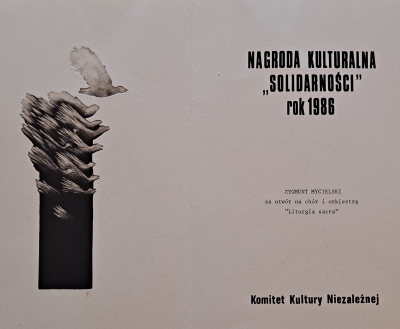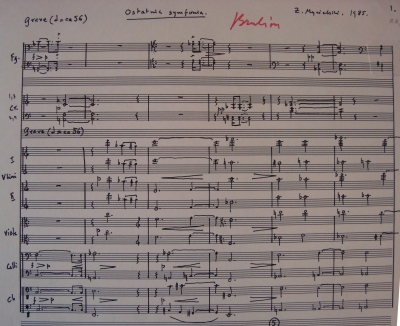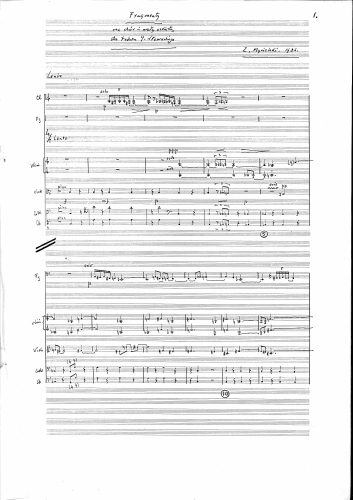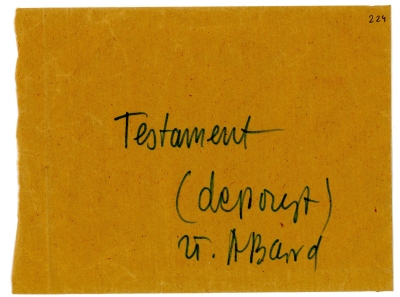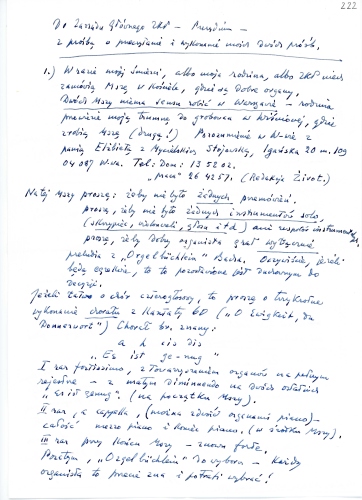As a result, the 1980s saw the emergence of some fine vocal-instrumental compositions in Zygmunt Mycielski’s oeuvre, works like Psalms for baritone, choir and orchestra (1982–83), Liturgia sacra for choir and orchestra (1983–84) as well as Fragments for choir and small orchestra, to words by Juliusz Słowacki (1986–87), the last piece written by the composer. There was also the miniature, moving Eternal Rest for mixed choir or solo voice and harmonium (1983–84) and the cycle Eight Songs to Words by Zbigniew Herbert for baritone and piano (1984). In addition, there were orchestral pieces: Fantasia for orchestra (1981) and Mycielski’s sixth and final Last Symphony (1985–86). This list alone demonstrates the creative potential revealed by Mycielski in his late period of activity as a composer, a time when he tackled the most important themes in his oeuvre, creating his most significant works in Psalms and Liturgia sacra.
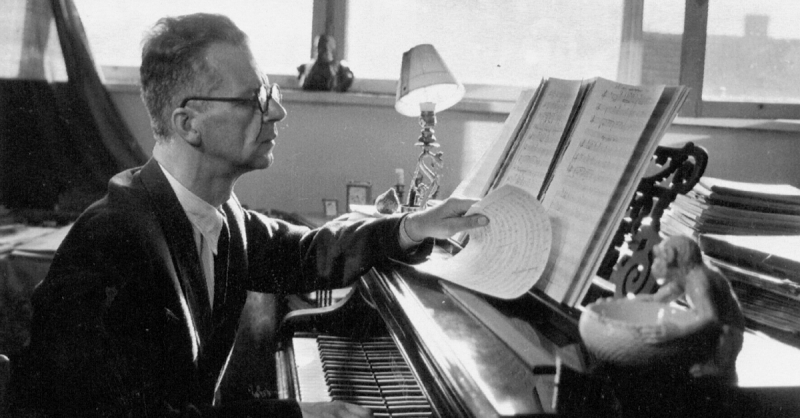
Final years
Mycielski composed a lot in the last few years of his life.
The work brought him the Polish Composers’ Union Prize as well as the prestigious “Solidarity” Award. It was a moment of a long-awaited triumph. Mycielski welcomed it, slightly surprised, with characteristic detachment. In late January 1987 he wrote do Andrzej Panufnik:
You have a wonderful ‘phase’ – I don’t doubt, with your oeuvre, I – a local success with the "Liturgia" and the "Psalms" (Zygmunt Mycielski to Andrzej Panufnik, Warsaw, 30/31 January 1987, in: "Zygmunt Mycielski – Andrzej Panufnik. Korespondencja", part 2: "Lata 1970–1987", Warsaw 2018).
While Psalm XII, performed for the first time at the 1984 Warsaw Autumn, brought Mycielski’s fairly tentative praise from the critics (but the presentation of only the middle of the Three Psams definitely did not convey the composer’s entire intention), after the performance of Liturgia sacra at the 1986 Warsaw Autumn Dorota Szwarcman wrote:
After Toshio Hosokawa’s delicate "Preludio" – a major experience: "Liturgia sacra" by Zygmunt Mycielski. A piece extraordinarily austere, as if stripped of all unnecessary appurtenances, purified, resembling Stravinsky’s "Requiem Canticles" – I find this association shocking, because I remember what Mycielski wrote about this particular work. The "Liturgia" is perceived as a testament, as a message and, at the same time, a confession of faith, which also encompasses fidelity (D. Szwarcman, “Z dziennika wytrwałej słuchaczki”, "Ruch Muzyczny", 1986 no. 23).
Both works are extremely important with regard to both their message and artistic form. A work that should be added to Mycielski’s catalogue of religious music composed in the first half of the 1980s is a modest musical setting for the prayer for the dead Eternal Rest. Mycielski wrote it in 1984, following a request of the Echo Choir from his home village of Wiśniowa. 1984 was also the year of the last song cycle in Mycielski’s oeuvre, Eight Songs to Words by Zbigniew Herbert for baritone and piano.
However, the 1980s were not just a time of religious works and songs for Mycielski. In 1981 he completed the anxiety-filled Fantasia for orchestra. And after completing Liturgia sacra, he felt a desire to compose a symphony. His sixth. He called it the Last. Towards the end of November 1984 he noted in his diary:
To make a whole, that is a picture, out of a multitude, that is chaos of thoughts, visions, ideas. This is how I hear the "Last Symphony". Still chaos, but in music the scale stretches from drama to peace, from rhythms and figures to a line, from interruptions to continuity, expectation, rigour and woven in cries. I see a strange thing coming. Perhaps I can do that. STILL (Warsaw, 19 November 1984, Z. Mycielski, "Niby-dziennik ostatni", Warsaw 2012).
In 1986 Mycielski felt increasingly unwell. On 7 January he arrived in Konstancin, where he wanted to finish his piece in peace. However, he was troubled more and more by stomach pains. In early March he went to a doctor and after returning from her, he noted down:
Yes, Mrs Płachecka found a tumour abdominis [abdominal tumour – B.B.-L.], she wanted to have me under the knife immediately. I managed to get permission to stay here until Tuesday (11 March) – to add a few bars (Warsaw, 19 November 1984, Z. Mycielski, "Niby-dziennik ostatni", Warsaw 2012).
Mycielski wanted to complete the symphony badly. He managed to do that, but he was not pleased with the result. After the surgery he wrote regretfully: “I’ve botched the Symphony. Am I able to fix it?” (Warsaw, 20 June 1986, Z. Mycielski, "Niby-dziennik ostatni", Warsaw 2012). In the end, a fair copy of the score preserved in his archive bears the inscription “completed on 10 March 1986 in Konstancin. (Before going to the hospital) – (I want to show it to J. Krenz)” (Zygmunt Mycielski Archive, National Library, no. V 10 064). However, the piece was never performed and has been preserved in its manuscript.
Shortly after the surgery Mycielski was planning another piece, Fragments for choir and small orchestra to words by Juliusz Słowacki. He knew that he did not have much time left. In May 1986 he wrote:
I think with all humility about Słowacki’s "Fragments" – my last escape into lyricism (?), which I may bring about, which I perhaps can bring about. Perhaps I will find the remains of my waning strength for that. I also think that this escape into lyricism or poetry is – (unfortunately?!) – the Polish way of responding to the disaster that is upon us (Warsaw, 18 May 1986, Z. Mycielski, "Niby-dziennik ostatni", Warsaw 2012).
Work on the piece gave him a lot of satisfaction, enabling him to forget about the illness and the reality around him at least for a moment. He really wanted to complete the piece.
The whole closes with a peaceful coda, in which God the Light blesses the whole world. Mycielski ends his work by melting it into silence. Like in his previous religious compositions, he seems to be humbly putting himself in the hands of God, submitting himself to his blessing with faith and hope. This beautiful, lyrical and deeply spiritual farewell by Mycielski with the world closes his oeuvre in a very meaningful manner. This was felt most completely probably by Michał Bristiger, who in his tribute to his late colleague wrote:
I am now listening how the music ends with the word "L i g h t" and a musical figure appearing also at the beginning of the piece, against a dark ground, when we still do not know what will come of it, and which comes true at the end. The word begins to glow ["świecić" in Polish] and contains within it both the world ["świat"] and its background ["tło"] and its – as Miłosz says – ‘fool’s cap’ with the ś and the ć, which the Polish language puts on solemn words and which Zygmunt knocks off the word with his last gesture, allowing it to shine freely. The voice of the flute breaks away, goes up quietly and calmly, until it reaches, in harmony with the last chord, its last note, until it becomes dispersed in a rest – without a fermata, pianissimo and ritenuto a piacere. I am listening to this silence, to this moment of passing, this moment of conversation, wanting to whisper: ‘Good night, sweet prince’ (M. Bristiger, “Zygmunt Mycielski” [tribute], "Res Facta Nova" 1994 no. 1 (10)).
Fragments was performed at the Warsaw Autumn Festival on 23 September 1987. The composer did not hear it. He died on 5 August 1987 in Warsaw. In accordance with his last will, he was buried in the crypt of the tomb chapel in Wiśniowa.
